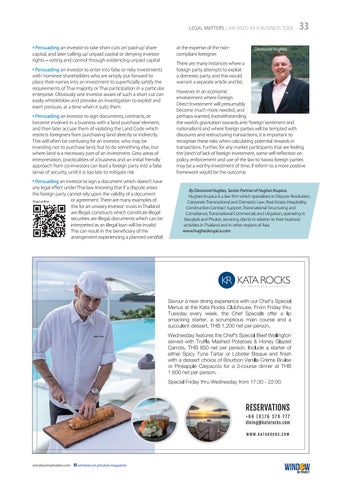legal matters. Law Used As a Business Tool • Persuading an investor to take short cuts on ‘paid-up’ share capital, and later ‘calling up’ unpaid capital or denying investor rights – voting and control through evidencing unpaid capital • Persuading an investor to enter into false or risky investments with ‘nominee’ shareholders who are simply put forward to place their names into an investment to superficially satisfy the requirements of Thai majority or Thai participation in a particular enterprise. Obviously one investor aware of such a short cut can easily whistleblow and provoke an investigation to exploit and exert pressure, at a time when it suits them. • Persuading an investor to sign documents, contracts, or become involved in a business with a ‘land purchase’ element, and then later accuse them of violating the Land Code which restricts foreigners from purchasing land directly or indirectly. This will often be confusing for an investor, who may be investing not to purchase land, but to do something else, but where land is a necessary part of an investment. Grey areas of interpretation, practicalities of a business and an initial friendly approach from co-investors can lead a foreign party into a false sense of security, until it is too late to mitigate risk • Persuading an investor to sign a document which doesn’t have any legal effect under Thai law, knowing that if a dispute arises the foreign party cannot rely upon the validity of a document or agreement. There are many examples of Read online this for an unwary investor: trusts in Thailand are illegal, constructs which constitute illegal securities are illegal, documents which can be interpreted as an illegal loan will be invalid. This can result in the beneficiary of the arrangement experiencing a planned windfall
windowonphuket.com
http://www.windowonphuket.com/
window.on.phuket.magazine
https://www.facebook.com/window.on.phuket.magazine https://www.facebook.com/window.on.phuket.magazine
at the expense of the noncompliant foreigner.
33
Desmond Hughes
There are many instances where a foreign party attempts to exploit a domestic party, and this would warrant a separate article and list. However, in an economic environment where Foreign Direct Investment will presumably become much more needed, and perhaps wanted, (notwithstanding the world’s gravitation towards anti-‘foreign’ sentiment and nationalism) and where foreign parties will be tempted with discounts and restructuring transactions, it is important to recognise these risks when calculating potential rewards in transactions. Further, for any market participants that are feeling the ‘pinch’ of lack of foreign investment, some self-reflection on policy, enforcement and use of the law to harass foreign parties may be a worthy investment of time, if reform to a more positive framework would be the outcome. By Desmond Hughes, Senior Partner of Hughes Krupica. Hughes Krupica is a law firm which specialises in Dispute Resolution; Corporate Transnational and Domestic Law; Real Estate; Hospitality; Construction Contract Support; Transnational Structuring and Compliance; Transnational Commercial; and Litigation, operating in Bangkok and Phuket, servicing clients in relation to their business activities in Thailand and in other regions of Asia www.hugheskrupica.com










